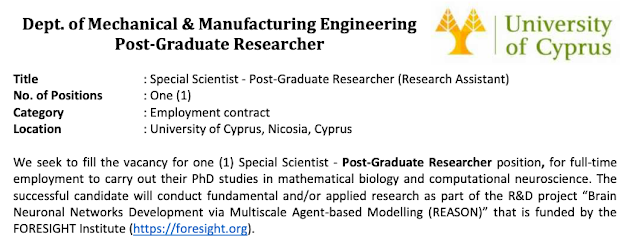New vacancy with BioDynaMo: Research Assistant at the Univ. of Cyprus
Would you like to conduct fundamental and/or applied research on “Brain Neuronal Networks Development via Multiscale Agent-based Modelling"? Don't miss this "Special Scientist - Post-Graduate Researcher (Research Assistant)" vacancy at the University of Cyprus, funded by the Foresight Institute
A great opportunity to join the #BioDynaMo team and work with Roman Bauer and Vasileios Vavourakis
Project description:
In this project, REASON, we will demonstrate an innovative computational approach to model and emulate biological NNs: rather than directly modelling a brain with all its complexity, we will model NN development from a single precursor cell. In other words, by leveraging the same approach that nature uses to build brains, we aim to reproduce challenging neural complexities. Inspired by the biological brain, we will make use of developmental rules that are encoded in a gene-type manner. For instance, a rule could be that a given neural stem cell should divide under certain conditions while they could migrate under others. Similarly, neural connections develop according to well-conserved mechanisms that are adaptive to individual neurons’ activities and wiring patterns.
To inform the computational modelling, we will make use of data from experimental studies as well as synthetic, simulated data. Well established characteristics of biological NNs will be used to inform realistic NNs, both structurally as well as functionally. We will make use of innovative machine learning techniques to match the in-silico NNs with specific organisms. In the early stages, we will employ synthetically generated NNs as a test scenario, and iteratively increase biological correspondence. We will make use of the agent- based modelling software BioDynaMo (www.biodynamo.org), an open-source software we have been actively developing for almost a decade. Notably, this project builds on previous work of the supervisory team, including for instance the simulation of a spatially embedded, functional, and biologically realistic neural network that self-organized from a single precursor cell (https://doi.org/10.1371/journal.pcbi.1003994).
The combination of machine learning techniques with agent-based learning is being explored by the group; notably, this PhD research is expected to generate a novel modelling approach to generate biologically realistic NNs using heterogeneous experimental data.




Comments
Post a Comment